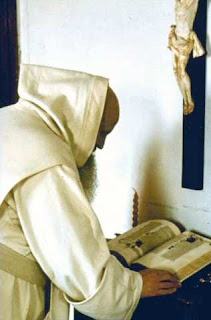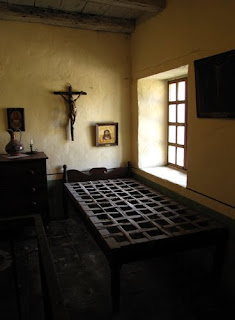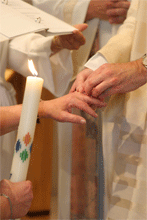 [[Dear Sister Laurel, I know you can answer this, but to me it seems tricky. Isn’t it true that the formation and the writing of a rule of life are substantially different for C. 603 hermits and lay hermits, whether these are good Christians and sincere God-seeking hermits or the fairly common people-haters, selfish lovers of their own company?
[[Dear Sister Laurel, I know you can answer this, but to me it seems tricky. Isn’t it true that the formation and the writing of a rule of life are substantially different for C. 603 hermits and lay hermits, whether these are good Christians and sincere God-seeking hermits or the fairly common people-haters, selfish lovers of their own company?
Could you say a few words about the kind of formation a loving Christian “beginner” on the path needs, and how to distinguish one’s calling? I am pretty sure about myself, but I have had some not-very-close friends who insisted they were true Christian hermits, yet showed few or none of the signs.]]
Thanks for your question. I don't believe that the formation for the Christian hermit is essentially the same as those you refer to as "fairly common people-haters, selfish lovers of their own company". I don't see how the lives of the latter involves any formation at all so for the purposes of this answer I am not referring to such persons. They are not hermits as the Church understands the term nor, perhaps, are they suitable to become hermits in the sense the Church uses that word. That leaves c 603 hermits and lay hermits. In regard to these two expressions of eremitical life I understand your question to be, [[Isn't it true that the formation and the writing of a Rule of Life are substantially different for these two groups of hermits?]] I sincerely hope I have understood your question. You also ask if I can say something about formation for the beginner, as well as about how a beginner discerns she is called to eremitical life.
Formation in the eremitical life is a matter of learning to live --- and being made capable of living --- a contemplative life of prayer and penance in the silence of solitude. It is a matter of being made more fully human in solitude and thus, learning to thrive there. That means not only becoming acclimated to solitude and silence, but developing a prayer life which moves one ever deeper into the life of God as reflected in the silence of solitude. While there are some things to do, some prayer forms to learn and tools to acquire which make such a life possible, formation is, most essentially, a matter of becoming a person for whom the silence of solitude (meaning here the relationship with God experienced in silence and resulting in personal stillness) is the context, goal, and heart of her life. If this relationship with God is truly the heart of her life it will pervade and condition everything she does --- no matter how mundane or apparently "unspiritual".
The Initial Years:
During these initial years the aspiring hermit is essentially preparing to write a Rule which reflects all she has learned about how God is calling her and what is essential to her response to that call. She might be ready to write an experimental Rule at the end of a year or two, for instance. She would then live this Rule for another year or two while occasionally tweaking it with the assistance of her spiritual director as she discerns more clearly what God is calling her to. For the person seeking to make a formal commitment with the profession of public vows --- a profession which binds her in law to live her Rule --- she needs to have moved past this experimental stage and have written a Rule she knows she can live which is also life giving in all the ways her prayer life requires. Such a Rule requires the aspiring hermit know herself fairly well just as it requires she knows the essential ways God works in her life, the various ways she is called to give herself in prayer, and the eremitical tradition which she desires to represent with her own life.
While formation and writing a Rule are not the same thing they are intimately related. Whenever a person manages to distill her life into a livable Rule --- a Rule which truly reflects her own needs for growth, prayer, work, social contact, recreation and which can assure these needs are met day by day --- she will find the experience immensely formative all by itself. Moreover, as she considers her life, the ways God works therein and the ways she best gives herself to God, she will be preparing to write a Rule even if she does not realize this is the case. Whenever she articulates for her spiritual director the ways God works in her life, the difficulties she meets, and the growth she has accomplished she is preparing to write or (perhaps) to redact her Rule.
Vastly Different Processes for Lay Hermits and c 603 Hermits?
 The primary difference between lay hermits and c 603 hermits in all of this besides the fact that a lay hermit does not make public vows, is the lay hermit will not be bound in law to live her Rule. This means that others will not have the same expectations of her as they would if she made a public commitment. Otherwise, however, I cannot see a lot of difference since whether one is a lay or a consecrated hermit the writing of a Rule requires the same experience, preparation, spiritual direction, and work distilling one's experience and knowledge. It is true that a solitary canonical hermit will need to include provisions for the essential elements of canon 603, but these elements are also common to any eremitical life so I don't think there need be much difference here. It is also true that a canonical hermit may be allowed the privilege of reserving Eucharist and all that entails while a lay hermit will not. This will cause some differences in the way each hermit approaches Mass attendance, for instance, but I don't think this means that the "formation and writing of a Rule are vastly different for a c 603 hermits and lay hermits."
The primary difference between lay hermits and c 603 hermits in all of this besides the fact that a lay hermit does not make public vows, is the lay hermit will not be bound in law to live her Rule. This means that others will not have the same expectations of her as they would if she made a public commitment. Otherwise, however, I cannot see a lot of difference since whether one is a lay or a consecrated hermit the writing of a Rule requires the same experience, preparation, spiritual direction, and work distilling one's experience and knowledge. It is true that a solitary canonical hermit will need to include provisions for the essential elements of canon 603, but these elements are also common to any eremitical life so I don't think there need be much difference here. It is also true that a canonical hermit may be allowed the privilege of reserving Eucharist and all that entails while a lay hermit will not. This will cause some differences in the way each hermit approaches Mass attendance, for instance, but I don't think this means that the "formation and writing of a Rule are vastly different for a c 603 hermits and lay hermits."The things I have written about composing Rules was not geared only to canonical hermits. A livable Rule, whether one is a lay hermit or will become a canonical hermit, is a profoundly and prudently demanding reality. Unless we want to say a lay hermit is really living a half-hearted life whose Rule requires far less than a c 603 hermit (and far less from them!) I think we have to recognize the eremitical life itself is more demanding than many realize; this means the Rule which structures and governs such a life is always similarly demanding.
As for formation, I think the same truth holds. ALL eremitical life requires formation whether or not that formation involves a formal process received in religious life or whether one acquires this on her own. Since any hermit must live the evangelical counsels and the essential elements of canon 603 whether or not they are publicly professed and bound in law to do so, any person desiring to live these realities will require formation in them. They will need to read about what they are doing so that they may understand what these values and central elements mean and entail. Again, unless a lay hermit is merely a name we give to someone in the lay state who is seeking to live something less than an authentic eremitical life, the need for formation, both initial and ongoing, as well as ongoing competent direction and oversight is simply an imperative. The life itself, a disciplined, demanding, and all-engaging life given over to God in the silence of solitude, requires these things whether or not the Church also requires them of the hermit!
Is One Really Called to Eremitical Life?
 I have written about discerning whether or not one has a call to eremitical life or not a number of times here and I am not sure I can add anything unless something I have said was unclear. You will need to let me know if that is the case. However, I can summarize some of the signs of a true vocation and perhaps some signs present in those not truly called to be hermits.
I have written about discerning whether or not one has a call to eremitical life or not a number of times here and I am not sure I can add anything unless something I have said was unclear. You will need to let me know if that is the case. However, I can summarize some of the signs of a true vocation and perhaps some signs present in those not truly called to be hermits.1) One should have a deep desire to be the person God calls them to be and be committed to seeking God in whatever ways God comes to them.
2) one should have a clear sense that the primary way this occurs for oneself is in a contemplative prayer life lived in the silence of solitude. (Clearly the person who never experiences real silence or solitude and who, for whatever reason, cannot make the commitment to these cannot draw such a conclusion.)
3) one should clearly thrive as a generous, loving, compassionate, human being in this context and come to do so ever more deeply so that silence and solitude as a physical context is transformed into the silence of solitude --- the silence of union with God who is the silent ground and source of creation. One's director and/or one's superiors should see signs that this is so while the hermit herself should be able to articulate a pattern of growth associated with becoming a whole and holier human being whose very life will benefit others.
4) one should be able to write a livable Rule on the basis of several years experience in solitude; this Rule should reflect one's own experience and a sense of the eremitical tradition one claims to represent with one's life.
5) one should be able to commit to living this Rule and be faithful to that commitment. (If changes are made to the Rule they should be made with the assistance of one's director, be occasional, and finally, they should be the result of growth in the life, not merely ways of attenuating the commitment one has made. An exception here is a situation of serious illness or aging.) This means that one is able to commit to the sacrifices and discipline involved in such a life and live out this commitment day in and day out over the whole of her life.
Signs one is not called:
1) One seeks to live as a hermit for some reason other than a deep desire to respond to God in a contemplative life of the silence of solitude. Any reason which is not generous at its root is either inadequate or inappropriate and will be insufficient to ground or sustain one's commitment in any case.
 2) One does not thrive in such a situation. Such a lack may show itself either in mediocrity in one's daily life which may include the failure to ever make a real commitment, in a lack of faithfulness to one's Rule and the need for distraction, in the failure to grow in one's capacity to love and be loved, or in outright development of personal bizarreness, mental instability and illness, unhealthy piety, isolation, and individualism. While solitude always creates some degree of disintegration that disintegration is part of a growth process which is more markedly one of reintegration and transfiguration. A competent director will be able to see these signs and so should a hermit that is at all self-aware.
2) One does not thrive in such a situation. Such a lack may show itself either in mediocrity in one's daily life which may include the failure to ever make a real commitment, in a lack of faithfulness to one's Rule and the need for distraction, in the failure to grow in one's capacity to love and be loved, or in outright development of personal bizarreness, mental instability and illness, unhealthy piety, isolation, and individualism. While solitude always creates some degree of disintegration that disintegration is part of a growth process which is more markedly one of reintegration and transfiguration. A competent director will be able to see these signs and so should a hermit that is at all self-aware.3) One experiences a persistent doubt one is called to this, experiences a persistent sense one is not fulfilled in such a setting, is driven to seek other ways of serving God and others, and is never personally capable of justifying eremitical life to others. (By this I mean one not called may well harbor deep or not so deep insecurities and doubts about the validity of the vocation itself. Only a person who knows first hand the redemption of her own emptiness and weakness in the starkness of solitude will be able to offer the justification required; this, of course, requires she has lived the life well enough to have experienced the kenosis it occasions.) One may be led to try this for any number of reasons including chronic illness, old age, etc, but unless one shows the signs listed above and truly grows to wholeness and holiness in this vocation --- meaning one is clear that this is the way God has called her to achieve the fullness of selfhood for the sake of others, an aspiring hermit should probably look elsewhere for their vocation.
4) One refuses to make the necessary sacrifices and commitments required to really be a hermit. This could include not educating oneself in terms of theology, spirituality, Scripture, etc, not assuring one seeks out the formation one requires, failing to get regular and competent spiritual direction or consistently resisting that direction, never really committing to either silence or solitude much less the silence of solitude, refusing to give one's entire abode over to God and to the values (poverty, chastity, obedience, etc) of eremitical life, resisting the discipline of a daily horarium (at least a general order and regularity in one's prayer and daily living) etc.




























































